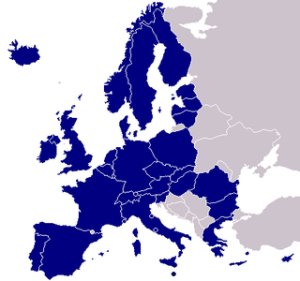 Many electronic payments will fail in Europe next month, unless the deadline for switching to the new SEPA payment system is extended, the European Commission warned Thursday.
Many electronic payments will fail in Europe next month, unless the deadline for switching to the new SEPA payment system is extended, the European Commission warned Thursday.
By 1st February, banks and businesses within the Single Euro Payments Area (SEPA) are supposed to accept only credit transfer and direct debit instructions conforming to rules creating a single European market for retail payments.
After that deadline, set in a 2012 regulation, instructions for euro payments that do not meet the specifications for SEPA Credit Transfers (SCT) or SEPA Direct Debits (SDD) should be rejected.
However, by November only 64.1 percent of euro credit transfers were SEPA compliant, and just 26 percent of direct debits, prompting the Commission to warn Thursday that it is now highly unlikely that the target of 100 percent for SCT and SDD can be reached by the deadline.
“If no action were to be taken by the Commission and the co-legislators, banks and payment services providers would be required to stop processing payments that differ from the SEPA format,” the Commission said, adding that this could result in “serious difficulties for market participants that are not yet ready, particularly SMEs, who could have their payments (incoming or outgoing) blocked.”
Banks and payment institutions should be allowed to process non-SEPA payments until 1st August, the Commission proposed, with no further transitional period after that. The proposal requires approval from the European Parliament and the Council of the European Union, composed of the ministers of member states, and could, according to the Commission, be applied retroactively if adopted after the deadline.
The Commission said its proposal does not change the “formal” deadline for migration, but will give businesses an extra six months to make their systems compliant, making sure their payments aren’t blocked.
Adoption of the new payment formats varies widely across the Single Euro Payment Area. European Central Bank (ECB) figures for the third quarter of 2013 show several countries are lagging well behind. In Germany only around 14 percent credit transfers were SCT-compliant, in Ireland a little over 15 percent and in Italy almost 23 percent.
Other euro area countries with fewer than 50 percent of SEPA-compliant credit transfers in the third quarter included the Netherlands, Austria, Portugal, Estonia and Malta.
The only euro area countries that had fully completed the SCT migration by then were Finland and Slovakia, closely followed by Slovenia which had over 99 percent SCT adoption. Non-euro area countries Denmark and the U.K. have also managed to complete their SCT migrations, ECB figures showed. Countries outside the euro area participate on a voluntary basis only.
Germany, as one of the biggest economies in the euro area, is also one of the biggest problems. Its central bank, the Deutsche Bundesbank, doesn’t seem to have been able to convince German businesses of the necessity of migrating to SEPA payments.
While the adoption pace has been picking up in Germany since the third quarter of last year, only 32 percent of all credit transfers there were SEPA Credit Transfers, said Carl-Ludwig Thiele, executive board member of the Deutsche Bundesbank responsible for
payment systems, in a report on 19th December on the country’s SEPA migration.
On a typical working day Germany handles about 25 million credit transfers worth about €227 billion (about US$309 billion), Thiele said. Germany still needs to convert 17 million credit transfers per day, he said at the time.
Germany’s adoption of SEPA Direct Debits was even lower and had reached 10 percent in November, Thiele said, adding that it is evident that many SMEs and small organisations still have to make the switch. On a typical working day Germany handles about 35 million direct debits worth about €52 billion, Thiele said, adding that this corresponds to a market share in the euro area of 47 percent.
While the proposal of the European Commission to extend the migration period buys the Germans some time, it should not lead to uncertainty about migration preparations, Thiele said in a news release published on Thursday in response to the Commission’s plans.
“I appeal to all market participants to consistently continue their SEPA projects and to maintain a conversion on 1st February,” he said, adding that while the Bundesbank is “confident” the goal can still be achieved by Feb. 1, in Germany, much remains to be done.





